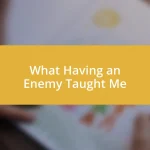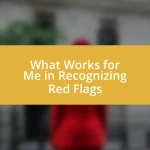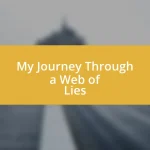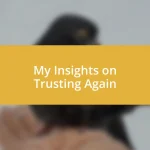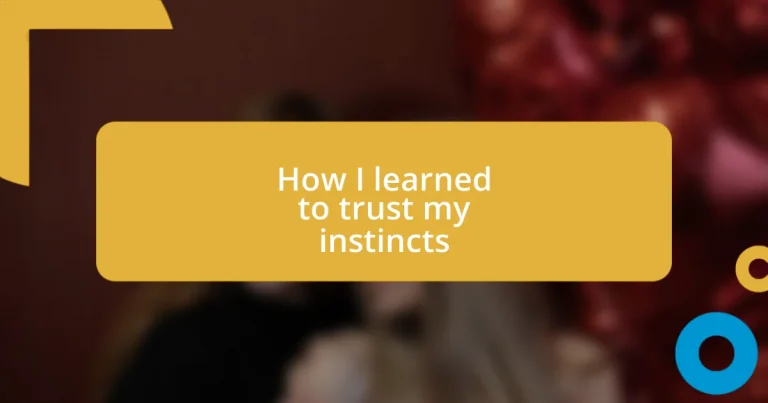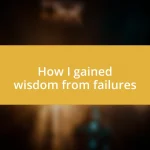Key takeaways:
- Instincts serve as essential guides, often reflecting past experiences and helping us navigate life’s complexities.
- Differentiating between fear and intuition can enhance decision-making; intuition feels calm and empowering, while fear creates paralysis and anxiety.
- Practicing mindfulness and self-reflection fosters self-awareness, confidence, and the ability to trust one’s instincts more effectively.
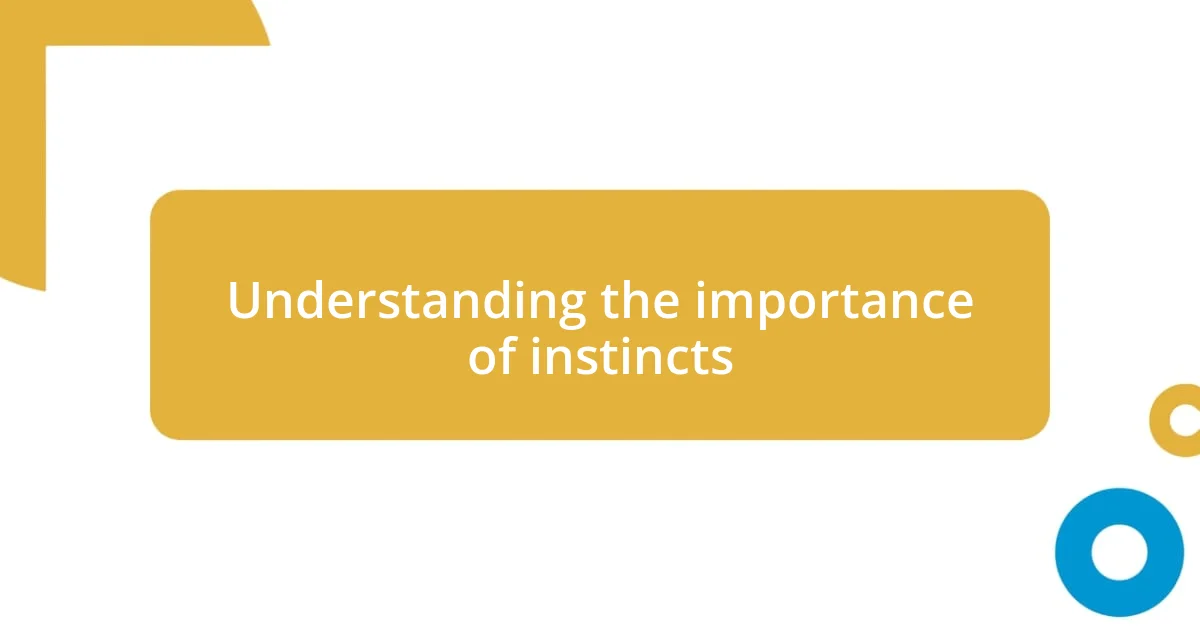
Understanding the importance of instincts
Instincts serve as our inner compass, guiding us even when logic falters. I remember a time when I faced a job opportunity that seemed perfect on paper, yet something felt off. Ignoring that gut feeling almost led me to a mismatch that would have drained my energy and affected my well-being.
When we talk about instincts, it’s fascinating how they often reflect our past experiences, even if we can’t pinpoint why. A few years ago, I walked into a room and immediately sensed an underlying tension. Instead of brushing it aside, I trusted that feeling and adjusted my approach, which ultimately helped in diffusing a potentially uncomfortable situation. Isn’t it incredible how our bodies can pick up on things our minds might not fully grasp?
Sometimes, I find myself wondering why we tend to dismiss our instincts, especially in a world that often prioritizes analytical thinking. I’ve learned that instincts can help us navigate life’s complexities and make quicker decisions. The times I’ve trusted that inner voice usually left me feeling more fulfilled and grounded, while ignoring it led to regret. Why not challenge ourselves to listen more closely to that instinctual wisdom?
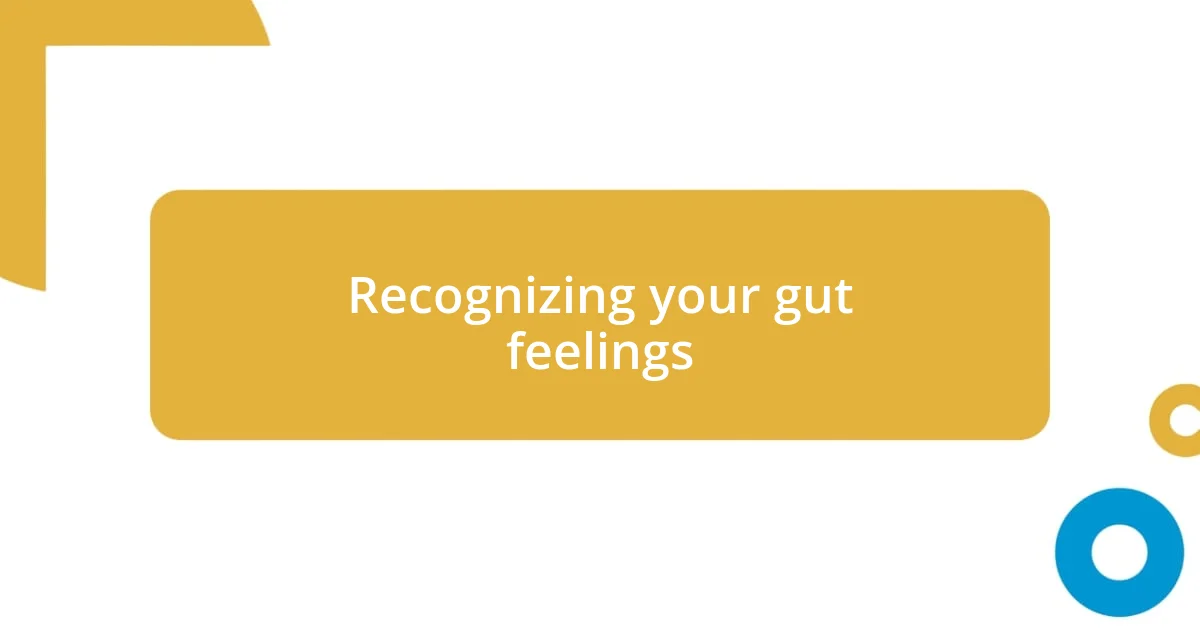
Recognizing your gut feelings
Recognizing your gut feelings can sometimes feel like deciphering a complex code. I still remember a dinner party where I met a new acquaintance. Though they seemed charming, an unsettling feeling bubbled up inside me: their words didn’t quite match their energy. Trusting that feeling, I maintained my distance, and later discovered that others had similar reservations about them. That simple instinct saved me from potential drama.
It’s interesting how our body often speaks before our mind catches up. There was a moment during a hiking trip when I felt a sudden chill as I approached a seemingly fine path. My instincts urged me to pause and reassess. I turned back just in time to avoid a steep drop that wasn’t marked on the map. It’s incredible how such subtle sensations can transform our decisions significantly.
Moreover, I’ve found that recognizing these instinctual nudges often stems from our ability to listen to ourselves. It can be as straightforward as paying attention to physical cues like tightness in the chest or a knot in the stomach. These sensations often point to something needing our attention. The more I train myself to notice them, the more in tune I become with what I truly want or need.
| Intuition | Analysis |
|---|---|
| Quick response | Takes time to process |
| Emotional connection | Rationale-based |
| Non-verbal cues | Relies on logic |
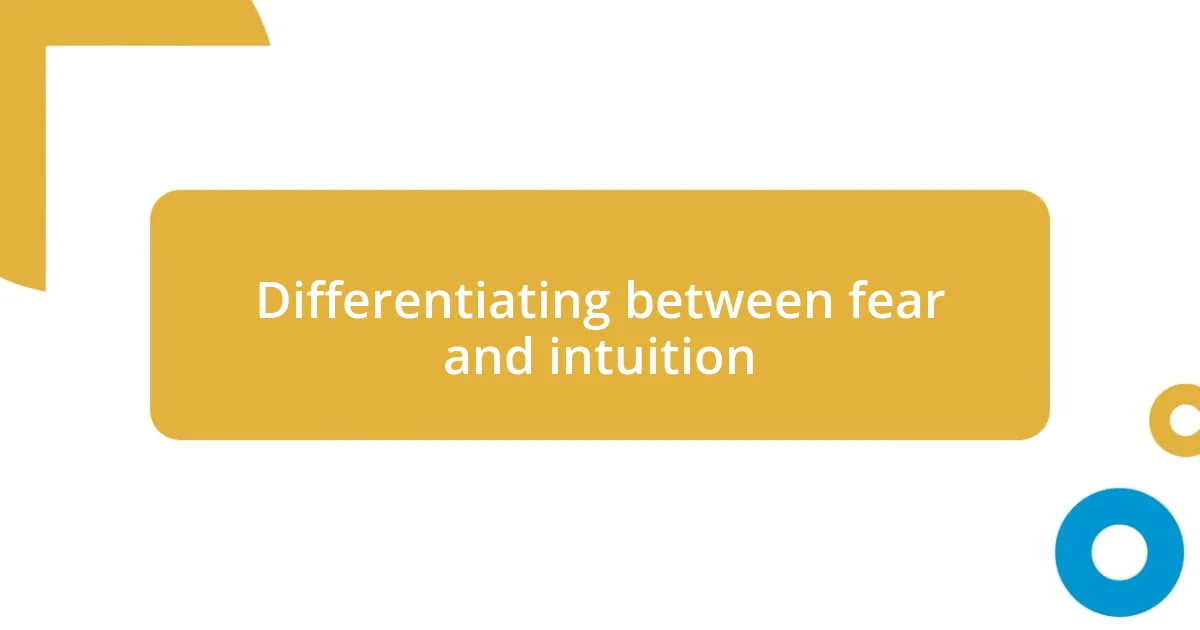
Differentiating between fear and intuition
It can be quite a journey to discern fear from intuition. I’ve experienced moments when my heart raced not from danger but from the fear of making the wrong choice. For instance, I once hesitated on whether to join a spontaneous trip with friends. Initially, my pulse quickened, feeding into a sense of anxiety. But as I tuned in deeper, I realized that it wasn’t a warning; it was simply the uncertainty of stepping outside my comfort zone. That realization made me embrace the adventure instead, and it turned out to be one of the best decisions I ever made.
To help differentiate these two feelings, it can be useful to consider a few key points:
- Fear tends to create a sense of paralysis. It can make you feel stuck and anxious.
- Intuition often offers clarity. When you listen closely, it’s more empowering and leads to proactive choices.
- Fear is reactive. It can be loud and disruptive, often fueled by external pressures.
- Intuition feels calm. It’s a subtle whisper that resonates within, aligning with your core values.
- Fear usually focuses on outcomes. It’s about what might go wrong rather than what could go right.
- Intuition is rooted in personal experience. It draws on knowledge you’ve unconsciously gathered over time.
Recognizing these differences has transformed my decision-making process, guiding me toward choices that feel authentic rather than fear-driven.
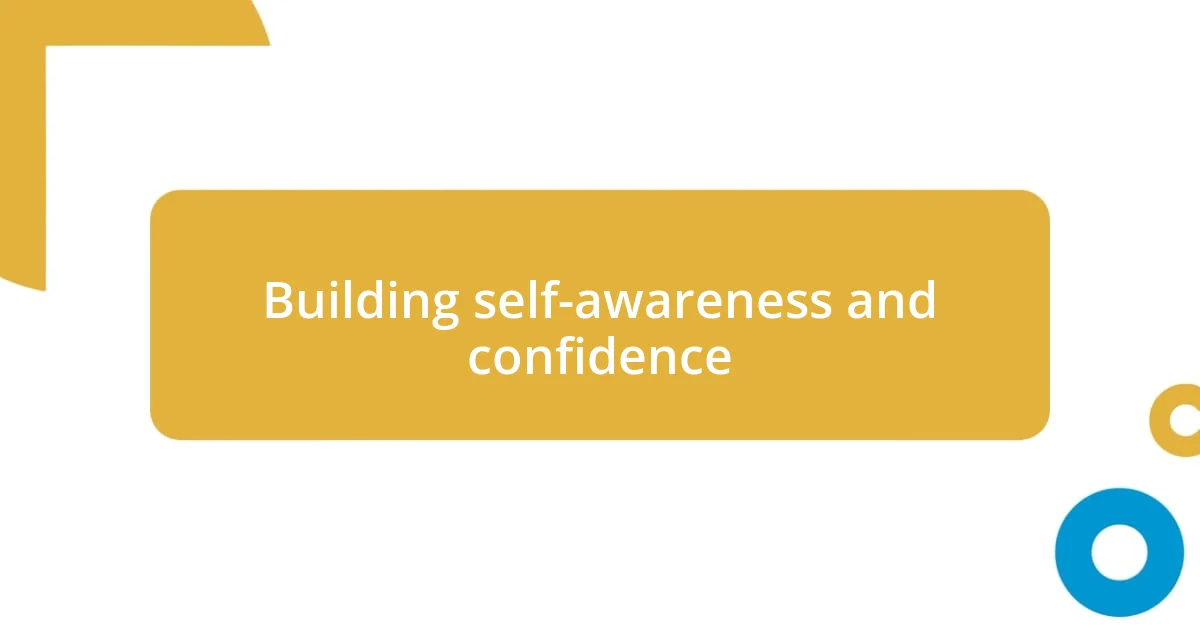
Building self-awareness and confidence
Building self-awareness is vital in nurturing confidence. I remember sitting alone in a quiet café, journaling about my thoughts and feelings one rainy afternoon. As I wrote, I began to unravel the layers of my emotions. It was as if a lightbulb went off, illuminating parts of myself that I had ignored for years. This practice not only helped me understand my instincts but also solidified my belief in my own thoughts. Have you ever tried journaling? It can truly spark your self-discovery journey.
Confidence doesn’t come overnight, and I learned that it often grows from self-reflection. After a challenging presentation at work, I took moments to assess what worked well and what didn’t. Did I feel nervous because I wasn’t prepared, or was it simply the natural response to being in front of an audience? It was through this analysis that I recognized my strengths and weaknesses. This understanding gradually built my self-assurance for future presentations, allowing me to trust my instincts more.
Sometimes, I find that taking small risks can boost both self-awareness and confidence. For example, I decided to join a local improv class, despite my fears of public embarrassment. The experience was eye-opening; placing myself in vulnerable situations helped me realize how quickly I could adapt and respond. It wasn’t about being perfect; it was about embracing the process of growth. Isn’t it fascinating how stepping out of our comfort zones can lead to more profound insights about ourselves?
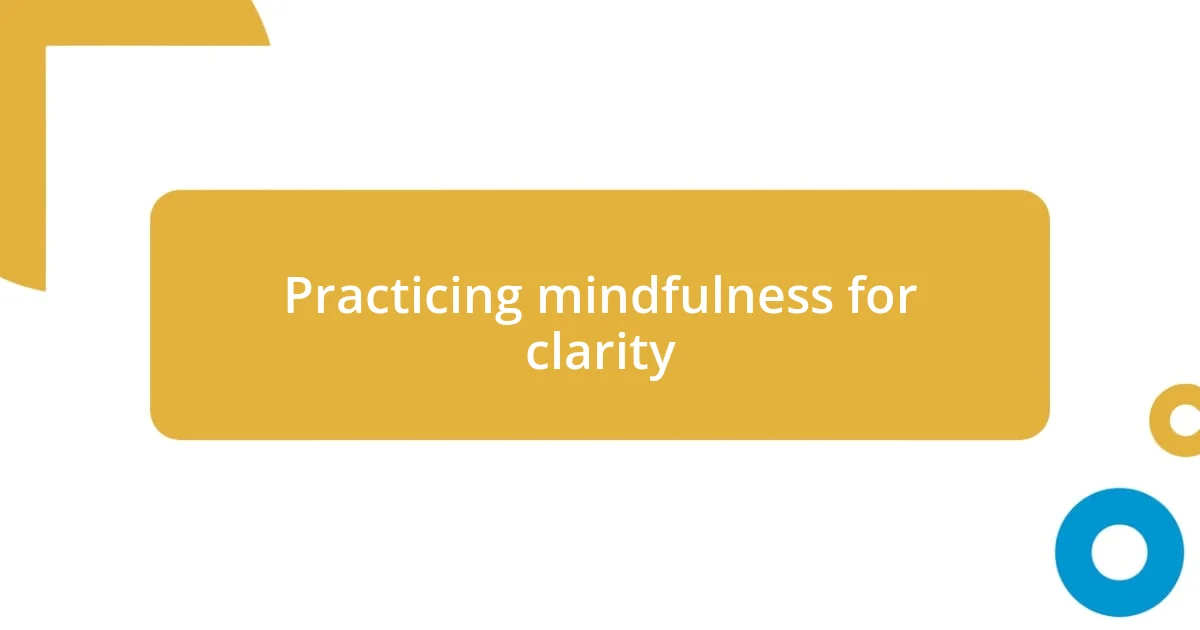
Practicing mindfulness for clarity
Mindfulness has been a game-changer for me in achieving clarity. During my morning walks, I often find myself fully immersed in nature, absorbing the sights and sounds around me. It feels as if each step brings me closer to understanding my thoughts better, allowing me to sift through the noise of daily life. Have you ever noticed how stillness can unveil insights hidden beneath the chaos? I certainly have.
One afternoon, I decided to practice mindfulness through a simple breathing exercise. Closing my eyes, I focused solely on my breath, inhaling deeply and exhaling slowly. Within minutes, I felt a weight lifting off my shoulders, and my scattered thoughts began to settle. I could hear the gentle rhythm of my breath, almost like a guiding force steering me toward a clearer perspective. This technique has become my anchor; it helps me tap into an inner sense of calmness that clarifies my instincts.
In practicing mindfulness, I also realized the power of being present. I recall a moment when I was overwhelmed with decisions about a potential career change. Instead of spiraling into anxiety, I sat with my feelings and allowed myself to explore what excited me most. That simple act of presence gave me the clarity to recognize what truly aligned with my passions, leading me to make a decision that felt right deep down. Have you tried just being present? The answers often emerge when we pause and truly listen to ourselves.
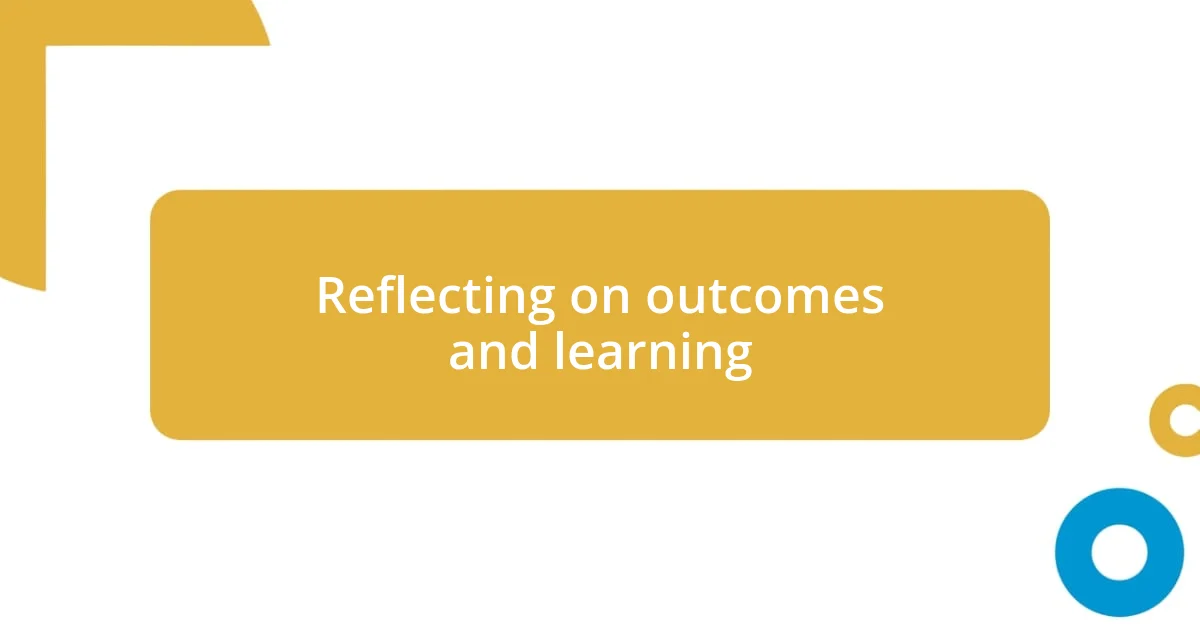
Reflecting on outcomes and learning
Reflecting on the outcomes of my decisions has always been enlightening. I recall a time when I chose to invest in a project despite the doubts swirling in my mind. After evaluating the eventual outcome, I realized that trusting my instinct had led to unexpected success. It was as though my gut feeling had sensed potential that my rational mind initially overlooked. Have you ever experienced a similar feeling? It’s intriguing how our instincts can act as an internal compass, guiding us even when the path seems unclear.
Looking back on my experiences, I find that embracing both successes and failures cultivates growth. I remember a moment when I trusted my instincts about a relationship. While it didn’t turn out the way I had hoped, reflecting on that choice taught me invaluable lessons about my boundaries and desires. This process of understanding what I sought in relationships improved my future choices. Isn’t it fascinating how each experience adds layers to our understanding of what feels right?
Each time I reflect, I feel like I’m piecing together a puzzle. There was an instance where I ignored a persistent feeling about a potential business partnership. Later, when things fell through, that nagging instinct clicked into place for me. This taught me that trust isn’t just about listening; it’s also about learning from what life throws at us. Do you take time to reflect on your choices? It’s remarkable how much clarity can emerge from simply looking back and processing our experiences.

